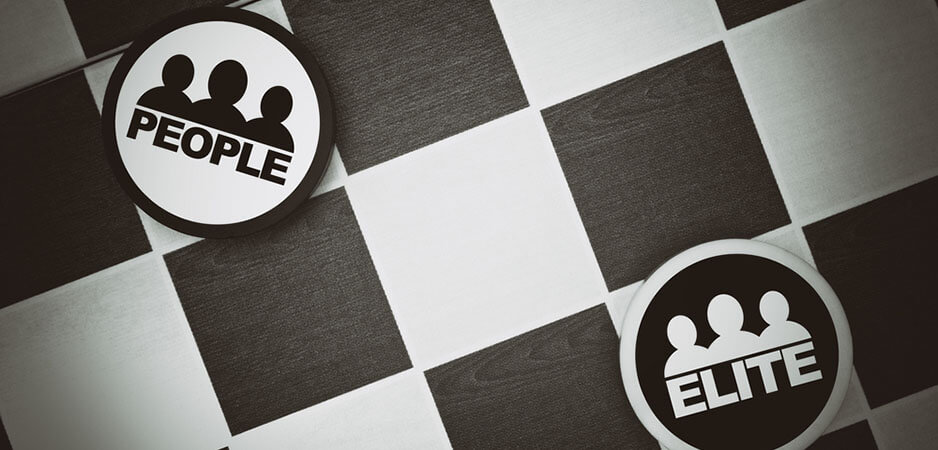When there is an elite that holds a dominant position in any society, it can become vulnerable to discontent.
Every human society produces an elite class. According to Thomas Piketty, what used to be singular has now become plural. Sophie Hardach, in an article published by the World Economic Forum, summarizes Piketty’s analysis of the political effects: “In a system of multiple elites, no major party has a strong incentive for ensuring that growth is inclusive.”
Here is today’s 3D definition:
Elites (plural noun):
The result of a strategic fragmentation of traditional power castes designed by the powerful to make it more difficult for the powerless to define the enemy against which they must revolt
Contextual note
The author cites “the findings of the World Economic Forum’s Inclusive Development Index, which provides evidence that growth alone does not foster socioeconomic progress.” This calls into question the strongest argument to justify the accumulation of wealth by a few: that they are the ones who ensure the growth that will lead to prosperity for everyone else, creating the conditions for upward mobility.
Piketty describes an evolution of modern representative democracy that employs a clever strategy of distraction by diversifying the nature of elites. Rather than seeking to help traditional non-members of the elite become upwardly mobile, the current trend has the effect of making it easier to separate the privileged classes from the poorer classes, not just increasing the gap in both wealth and income, but also establishing a hermetic psychological barrier between the different categories of the successful and what Donald Trump likes to call “the losers.”
In the language of military strategy, this might be termed outflanking the opponent. Understood in this way, the “opponent” would be anyone who seeks to reduce inequality and avoid a rigidly stratified class system. Theoretically (and ideologically), everyone in a modern democracy is expected to be in favor of greater equality and opposed to practices that exacerbate inequality. After all, the first modern democracy came into being in North America by declaring that “all men are created equal.” And though their fortunes and destinies may differ, they all deserved the means to pursue their happiness.
When there is a single elite, an identifiable class, that holds a dominant position in any society, it can become vulnerable to discontent. But today there are a multitude of elites: the traditional captains of industry but also celebrities from the world of entertainment and sports; Silicon Valley entrepreneurs believed by virtue of their success to be geniuses; Wall Street traders; charismatic and well-funded politicians; YouTube pundits; and even the occasional scientist or doctor celebrated by the media. When inequality emerges from all sides, it becomes impossible to focus the effort of revolt.
Historical note
In the history of industrial capitalism, on many occasions the workers rose up against the easily identified class of capitalist factory owners who they felt were exploiting them and preventing them from proving themselves equal. They recognized a cigar-smoking elite in a top hat that could be worn by ruthless capitalists but also by corrupt politicians. The diversification of elites that gradually unfolded after World War II achieved two goals: It created the illusion that there were multiple paths to realize the American Dream, and it made it much more difficult to identify one group of people who held the reins of power and systematically abused the working classes.
 The realization that upward mobility has ended and that inequality is consistently increasing poses a new problem for modern democracies. Democracies have always promoted equality as a core value and increased equality as a fundamental social goal. The populations of democracies maintain the expectation that prosperity will be shared and inequality reduced.
The realization that upward mobility has ended and that inequality is consistently increasing poses a new problem for modern democracies. Democracies have always promoted equality as a core value and increased equality as a fundamental social goal. The populations of democracies maintain the expectation that prosperity will be shared and inequality reduced.
At the same time, the ideology of the free market economy has always sought to ensure the growth that will presumably lead to shared prosperity by encouraging and rewarding the accumulation of personal wealth. The contradiction has suddenly become flagrant. Economic logic has entered into a head-on conflict with political logic. The multiple elites have captured for themselves the prosperity resulting from growth and left the citizens of democracy not only behind, but excluded from the playground of the elites. Their disempowered citizens can only observe the privileged elites through the media, on reality TV and via a news cycle that offers them the never-ending and increasingly ineffectual acts of a hyperreal political circus.
The strategy of distraction and outflanking the enemy seems to have worked in that there is no focus for people’s growing discontent, but the mounting confusion is likely to lead to growing pressure for radical change. The elites will have to decide how to relieve the pressure, but are the unified enough in their diversity to do that?
*[In the age of Oscar Wilde and Mark Twain, another American wit, the journalist Ambrose Bierce, produced a series of satirical definitions of commonly used terms, throwing light on their hidden meanings in real discourse. Bierce eventually collected and published them as a book, The Devil’s Dictionary, in 1911. We have shamelessly appropriated his title in the interest of continuing his wholesome pedagogical effort to enlighten generations of readers of the news. Updated: May 12, 2018, at 11:40 GMT.]
The views expressed in this article are the author’s own and do not necessarily reflect Fair Observer’s editorial policy.
Photo Credit: M-SUR / Shutterstock.com
Support Fair Observer
We rely on your support for our independence, diversity and quality.
For more than 10 years, Fair Observer has been free, fair and independent. No billionaire owns us, no advertisers control us. We are a reader-supported nonprofit. Unlike many other publications, we keep our content free for readers regardless of where they live or whether they can afford to pay. We have no paywalls and no ads.
In the post-truth era of fake news, echo chambers and filter bubbles, we publish a plurality of perspectives from around the world. Anyone can publish with us, but everyone goes through a rigorous editorial process. So, you get fact-checked, well-reasoned content instead of noise.
We publish 2,500+ voices from 90+ countries. We also conduct education and training programs
on subjects ranging from digital media and journalism to writing and critical thinking. This
doesn’t come cheap. Servers, editors, trainers and web developers cost
money.
Please consider supporting us on a regular basis as a recurring donor or a
sustaining member.
Will you support FO’s journalism?
We rely on your support for our independence, diversity and quality.






